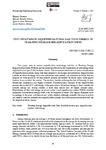Exploitation of Liquefied Natural Gas Cold Energy in Floating Storage Regasification Units

Use este enlace para citar
http://hdl.handle.net/2183/30477
A non ser que se indique outra cousa, a licenza do ítem descríbese como Atribución 4.0 Internacional
Coleccións
Metadatos
Mostrar o rexistro completo do ítemTítulo
Exploitation of Liquefied Natural Gas Cold Energy in Floating Storage Regasification UnitsData
2021Cita bibliográfica
Naveiro, M., Romero Gómez, M., Arias Fernández, I. & Romero Gómez, J. (2021). Exploitation of liquefied natural gas cold energy in floating storage regasification units. Brodogradnja, 72 (4), 47-78. https://doi.org/10.21278/brod72404
Resumo
[Abstract] This paper aims to review regasification technology installed in Floating Storage Regasification Units (FSRUs) and the potential offered by the exploitation of cold energy from liquefied natural gas (LNG) in these vessels. The assessment describes the main characteristics of regasification systems along with their respective advantages and limitations. Regasification systems in direct exchange (seawater and steam) and systems with intermediate fluids that use propane or water-glycol in the heat transfer process are studied. In recent years, water-glycol systems have cornered the market. The mixture, besides reducing the risk of freezing, is non-flammable, economical and highly available. Thermodynamic analysis of the regasification process shows that LNG cold energy is the main source of residual energy in these vessels; the specific energy and exergy content is more than double that of engine exhaust gases. Exploitation of this cold energy in power cycles could significantly reduce FSRUs harmful emissions and electrical energy could even be exported to shore. The organic Rankine cycle technology is the most well-known and widely studied, although scientific literature is scarce and there is a need to propose new regasification systems with cold energy exploitation that can be adopted on these vessels.
Palabras chave
Floating storage regasification unit
Liquefied natural gas
Regasification system
Cold energy
Liquefied natural gas
Regasification system
Cold energy
Versión do editor
Dereitos
Atribución 4.0 Internacional
ISSN
1845-5859






